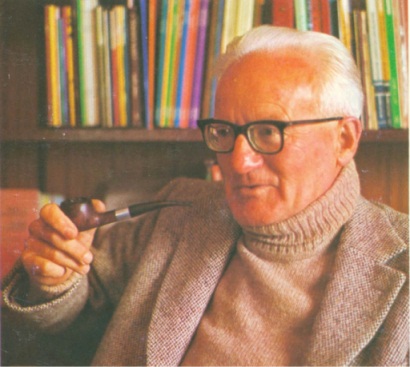Ian A. Gordon Trust Fund
The Ian A. Gordon Trust Fund supports scholarships, fellowships and other research-related awards in the School of Linguistics and Applied Language Studies.
The I.A. Gordon Trust was set up in 2003 as the result of a generous bequest of half a million dollars from Victoria University of Wellington’s Emeritus Professor Ian Gordon to support the study of English language and linguistics at Victoria University of Wellington.
It was Professor Gordon’s wish that income from his endowment be used in perpetuity for scholarships, fellowships, and other awards to support and recognise outstanding research in the School of Linguistics and Applied Language Studies.
Professor Ian A. Gordon (1908–2004)

Prof Gordon graduated from the University of Edinburgh and taught there before his appointment to the Chair of English Language and Literature at Victoria University of Wellington, a position he held from 1936 to 1974. He was instrumental in establishing the study of the structure, history, and use of English, and the teaching of the English language at the University.
Ian Gordon was Vice-Chancellor of the University of New Zealand from 1947 to 1952, Chair of the New Zealand Literary Fund from 1950 to 1974, and a member of the University Grants Committee from 1961 to 1971, in addition to holding many other academic and administrative posts. He was made a CBE and received several honorary doctorates.
The breadth of his scholarship was remarkable, including his book, The Movement of English Prose (1966) a widely recognised survey of the continuity of English prose style from the 9th to the 20th century, definitive studies on Katherine Mansfield, and 18th century Scottish writer John Galt; and as one of the founding fathers of New Zealand English lexicography, editing New Zealand editions of Collins dictionaries.
He undertook much teaching, writing, and broadcasting on the evolution of English, problems of usage, and the teaching of English. He was widely regarded as an excellent teacher.
One outstanding contribution was his work to encourage and foster his own passion for language in others. Among his former students are Bob Burchfield, who became editor of the Oxford English Dictionary, Bill Ramson, who edited the Australian National Dictionary, and Harry Orsman, who compiled the celebrated Dictionary of New Zealand English.
Prof Gordon encouraged the development at Victoria University of Wellington of a strong tradition of lexicography which has continued through his students and through the establishment of the New Zealand Dictionary Centre.
He was instrumental in the establishment of the English Language Institute in 1961 (now part of the School of Linguistics and Applied Language Studies). Along with Professor Frank Brosnahan, he supported the introduction of the teaching of Linguistics at the University from 1970, initially under the aegis of the Department of English, and later as a distinct discipline.
He had his own show on National Radio and wrote popular columns on language in the NZ Listener, New Scientist and Readers Digest. He wrote 20 books, including A Word in Your Ear and Take My Word for It.
Management of the Trust Professor Gordon’s endowment is administered by a Trust Fund Committee on behalf of the Victoria University of Wellington Foundation. In most years, suitable language researchers are invited to spend time as fellows in the School of Linguistics and Applied Language Studies and contribute to its teaching, research, and seminar programme.
Previous I.A. Gordon Fellows
See a full list of previous I.A. Gordon Fellows and find information about their contributions as Fellows.
Awards and Scholarships
The Ian Gordon Trust funds a number of other activities which support the research culture of the School. These include the Ian Gordon Prize in Linguistics, which is awarded annually for the best piece(s) of completed research (essay, project, or thesis) by Honours or Master’s students in the School of Linguistics and Applied Language Studies. The Trust also funds the Ian Gordon Master's Scholarship, which supports students undertaking a Master's degree by coursework in Linguistics, Applied Linguistics or TESOL at Te Herenga Waka—Victoria University of Wellington.
In addition to the Endowment Fund, Professor Gordon sponsored the Ian A. Gordon Prize in Linguistics, which was awarded annually until 2023 for the best piece of completed research (essay, project or thesis) on any aspect of the nature, structure or use of the English language by an Honours or Masters student in the School of Linguistics and Applied Language Studies.
He also established in memory of his wife, May Gordon, an annual prize for the best female student in the introductory course in English literature.
Winners of the Ian Gordon Prize in Linguistics
See a list of the winners of the Ian Gordon Prize in Linguistics.
